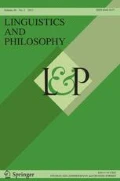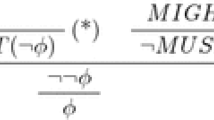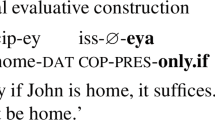Abstract
Predicates of personal taste (fun, tasty) and epistemic modals (might, must) share a similar analytical difficulty in determining whose taste or knowledge is being expressed. Accordingly, they have parallel behavior in attitude reports and in a certain kind of disagreement. On the other hand, they differ in how freely they can be linked to a contextually salient individual, with epistemic modals being much more restricted in this respect. I propose an account of both classes using Lasersohn’s (Linguistics and Philosophy 28: 643–686, 2005) “judge” parameter, at the same time arguing for crucial changes to Lasersohn’s view in order to allow the extension to epistemic modals and address empirical problems faced by his account.
Similar content being viewed by others
References
Chierchia G. (1989). Anaphora and attitudes de se. In: Bartsch R., van Benthem J., van Emde Boas P. (eds). Language in context. Dordrecht, Foris, pp. 1-31
DeRose K. (1991). Epistemic possibilities. The Philosophical Review 100, 581–605
Egan A. (2007). Epistemic modals, relativism, and assertion. Philosophical Studies 133, 1–22
Egan A., Hawthorne J., Weatherson B. (2005). Epistemic modals in context. In: Preyer G., Peter G. (eds). Contextualism in philosophy: Knowledge, meaning, and truth. Oxford, Oxford University Press, pp. 131-170
Groenendijk, J., & Stokhof, M. (1984). Studies on the semantics of questions and the pragmatics of answers. Ph.D., University of Amsterdam.
Hacking I. (1967). Possibility. Philosophical Review 76, 143–168
Hamblin C.L. (1973). Questions in Montague English. Foundations of Language 10, 41–53
Heim I.,Kratzer A. (1998). Semantics in generative grammar. Oxford, Blackwell
Hooper J. (1975). On assertive predicates. In: Kimball J.P. (ed). Syntax and semantics (Vol. 4). New York, Academic Press, pp. 91-124
Kaplan D. (1989). Demonstratives. In: Almog J., Perry J., Wettstein H. (eds). Themes from Kaplan. Oxford, Oxford University Press
Kratzer A. (1977). What ‘must′ and ‘can’ must and can mean. Linguistics and Philosophy 1, 337–355
Kratzer A. (1981). The notional category of modality. In: Eikmeyer H.-J., Rieser H. (eds). Words, worlds, and contexts. New approaches in word semantics. Berlin, de Gruyter, pp. 38–74
Kratzer A. (1991). Modality. In: von Stechow A., Wunderlich D. (eds). Semantik. Ein internationales Handbuch der zeitgenössischen Forschung. Berlin, de Gruyter, pp. 639–650
Lasersohn P. (2005). Context dependence, disagreement, and predicates of personal taste. Linguistics and Philosophy 28, 643–686
Lewis D. (1979). Attitudes de dicto and de se. Philosophical Review 88, 513–543
MacFarlane, J. (2006). Epistemic modals are assessment-sensitive. Ms., UC Berkeley. URL: http://sophos.berkeley.edu/macfarlane/epistmod.pdf.
McCready, E. (2006). Shifting contexts? That might be good. Paper Presented at Sinn und Bedeutung 11, Universitat Pompeu Fabra, Barcelona, September 22, 2006.
Moltmann, F. (2005). Relative truth and the first person. Ms., Semantics Archive. URL: http://semanticsarchive.net/Archive/mY2NGJhY/.
Moore, G. E. (1962). Common place book 1919–1953. London: George, Allen, and Unwin.
Schwarzschild R. (1994). Plurals, presuppositions and the sources of distributivity. Natural Language Semantics, 2, 201–248
Simons, M. (2005). Observations on embedding verbs, evidentiality, and presupposition. Ms., Carnegie Mellon University. URL: http://www.hss.cmu.edu/philosophy/simons/embedding20verbs.submitted.pdf.
Speas, P. (2004). Person (and mood and tense) and indexicality. Paper Presented at the Harvard Workshop on Indexicals, Speech Acts, and Logophors, Harvard University, Cambridge, Massachusetts, November 20, 2004.
Stalnaker, R. (1978). Assertion. Reprinted in P. Portner & B. H. Partee (Eds.). (2002), Formal semantics: The essential readings (pp. 174–161). Oxford: Blackwell.
Stalnaker R. (1984). Inquiry. Cambridge, Massachusetts, MIT Press
Stalnaker R. (2002). Common ground. Linguistics and Philosophy 25, 701–721
Stephenson, T. (2005). Assessor sensitivity: Epistemic modals and predicates of personal taste. In J. Gajewski, V. Hacquard, B. Nickel, & S. Yalcin (Eds.), New work on modality, MIT working papers in linguistics (Vol. 51, pp. 179–206). Cambridge, Massachusetts: MITWPL.
Stephenson, T. (2006). A parallel account of epistemic modals and predicates of personal taste. Paper Presented at Sinn und Bedeutung 11, Universitat Pompeu Fabra, Barcelona, September 22, 2006.
Tenny C. (2006). Evidentiality, experiencers, and the syntax of sentience in Japanese. Journal of East Asian Linguistics 15, 245–288
Urmson J. (1952). Parenthetical verbs. Mind 61, 480–496
von Fintel, K., & Gillies, A. (2005). “Might” made right. Handout from philosophy colloquium at the University of Texas at Austin. URL: http://mit.edu/fintel/www/might.pdf.
von Fintel, K., & Gillies, A. (2006). CIA leaks. Pacific APA, First Draft. URL: http://mit.edu/fintel/www/cia_leaks.pdf.
von Fintel K., Iatridou S. (2003). Epistemic containment. Linguistic Inquiry 34, 173–198
Author information
Authors and Affiliations
Corresponding author
Rights and permissions
About this article
Cite this article
Stephenson, T. Judge dependence, epistemic modals, and predicates of personal taste. Linguist and Philos 30, 487–525 (2007). https://doi.org/10.1007/s10988-008-9023-4
Received:
Accepted:
Published:
Issue Date:
DOI: https://doi.org/10.1007/s10988-008-9023-4




